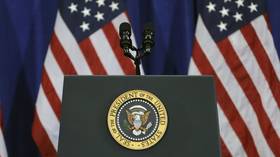US forced firms to cut ties with USSR during 1970s arms race – declassified doc
Washington threatened to revoke military contracts if companies didn’t stop cooperating with the Soviet state, according to a newly released file
Major American corporations were heavily pressured to cut ties with the USSR during the arms race in the late 1970s, according to a declassified document published by Russia’s Federal Security Service (FSB).
Jimmy Carter, who was US president from 1977 to 1981, is known for intensifying the nuclear arms race and pushing to distance his administration from the Soviet Union. The policy decisions made during this time included postponing work on the Strategic Arms Limitation Treaty, freezing economic and cultural exchanges between the two countries, limiting trade and banning licenses for the sale of sophisticated technologies to the USSR.
The declassified report, which is dated June 1980 and signed by KGB head Yury Andropov, is devoted to the state of Soviet-American relations. The report cites alleged confidential statements made by a General Electric vice president, as well as the heads of US aircraft manufacturer Northrop and petroleum corporation Atlantic Richfield Company.
According to the report, the Carter administration threatened to revoke the military contracts of companies that did not cut ties with Soviet organizations. It states that representatives of many large US corporations “expressed dissatisfaction” that politics were meddling in business affairs, which they said impeded on traditional economic ties, limited the scope for business, and forced companies to miss out on profitable deals.
Moreover, US business titans were hoping for change, the document stated, noting that “even the Rockefellers,” the American industrial and banking family that still owns one of the world’s largest fortunes and which heavily invested in Carter’s presidential campaign, was “beginning to get worried.”
The report claimed that some within the US State Department and Carter’s Democratic Party understood that “the business world is not happy with the unbridled escalation of tensions,” and unofficially signaled that companies should “maintain certain connections” with their Soviet counterparts.
“As numerous conversations with representatives of American business and political circles show, there is a growing understanding of the need to normalize Soviet-American relations, and growing hope that after the elections the situation would change for the better,” the document stated.
Commenting on the declassified report, Oleg Matveyev, an expert at the National Center of Historical Memory under the Russian president, said it effectively mirrors the current state of US-Russian relations, and illustrates how sanctions backfire on those who impose them.
“As history, and today’s events around Ukraine, show, sanctions are a double-edged sword, capable of delivering a grievous blow not only to one’s adversary’s economy, but also to one’s own,” Matveyev said, adding that “enormous profits were slipping away from the hands of American businessmen,” which is true “both then and now.”






Comments are closed.